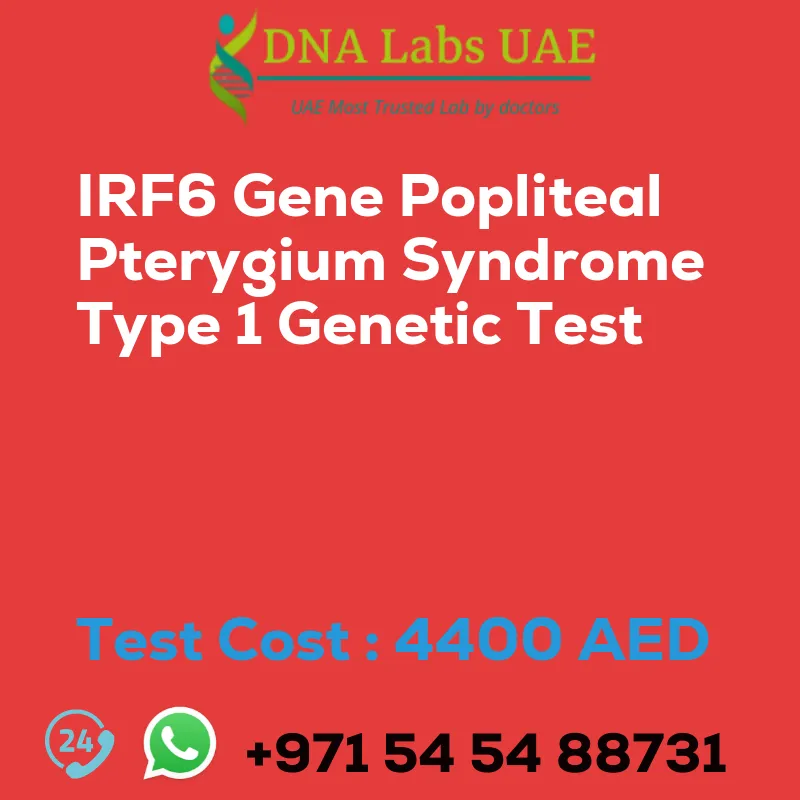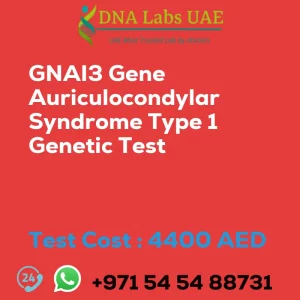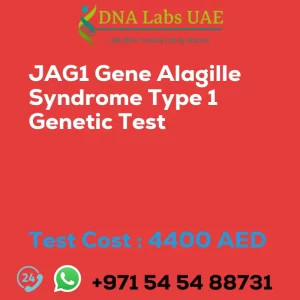IRF6 Gene Popliteal Pterygium Syndrome Type 1 Genetic Test
Test Details
The IRF6 gene is responsible for producing a protein that plays a crucial role in the development of various tissues and organs, including the face, skin, and genitals. Mutations in the IRF6 gene can lead to a condition known as popliteal pterygium syndrome type 1 (PPS1).
PPS1 is a rare genetic disorder characterized by several physical abnormalities, including cleft lip and/or palate, webbing of the skin on the back of the knee (popliteal pterygium), and abnormalities of the fingers and/or toes. It is inherited in an autosomal dominant manner, which means that a mutation in only one copy of the IRF6 gene is sufficient to cause the condition.
Test Name: IRF6 Gene Popliteal Pterygium Syndrome Type 1 Genetic Test
Components:
- Price: 4400.0 AED
- Sample Condition: Blood or Extracted DNA or One drop Blood on FTA Card
- Report Delivery: 3 to 4 Weeks
- Method: NGS Technology
- Test Type: Dysmorphology
- Doctor: Pediatrics
- Test Department: Genetics
Pre Test Information
Clinical History of Patient who is going for IRF6 Gene Popliteal Pterygium Syndrome Type 1 NGS Genetic DNA Test. A Genetic Counselling session to draw a pedigree chart of family members affected with IRF6 Gene Popliteal Pterygium Syndrome Type 1 NGS Genetic DNA Test gene IRF6.
Test Details
NGS (Next-Generation Sequencing) genetic testing is a type of genetic testing that allows for the simultaneous analysis of multiple genes or the entire genome. In the case of PPS1, NGS genetic testing can be used to identify mutations in the IRF6 gene.
This testing can help confirm a diagnosis of PPS1 in individuals with characteristic symptoms and can also be used for carrier testing and prenatal diagnosis in families with a known IRF6 gene mutation. It is important to note that genetic testing for PPS1 should be performed by a qualified healthcare professional or genetic counselor who can provide appropriate counseling and interpretation of the results.
Genetic testing can provide valuable information for individuals and families affected by PPS1, including information about the inheritance pattern, recurrence risk, and potential treatment options.
| Test Name | IRF6 Gene Popliteal pterygium syndrome type 1 Genetic Test |
|---|---|
| Components | |
| Price | 4400.0 AED |
| Sample Condition | Blood or Extracted DNA or One drop Blood on FTA Card |
| Report Delivery | 3 to 4 Weeks |
| Method | NGS Technology |
| Test type | Dysmorphology |
| Doctor | Pediatrics |
| Test Department: | Genetics |
| Pre Test Information | Clinical History of Patient who is going for IRF6 Gene Popliteal pterygium syndrome type 1 NGS Genetic DNA Test. A Genetic Counselling session to draw a pedigree chart of family members affected with IRF6 Gene Popliteal pterygium syndrome type 1 NGS Genetic DNA Test gene IRF6 |
| Test Details |
The IRF6 gene is responsible for producing a protein that plays a crucial role in the development of various tissues and organs, including the face, skin, and genitals. Mutations in the IRF6 gene can lead to a condition known as popliteal pterygium syndrome type 1 (PPS1). PPS1 is a rare genetic disorder characterized by several physical abnormalities, including cleft lip and/or palate, webbing of the skin on the back of the knee (popliteal pterygium), and abnormalities of the fingers and/or toes. It is inherited in an autosomal dominant manner, which means that a mutation in only one copy of the IRF6 gene is sufficient to cause the condition. NGS (Next-Generation Sequencing) genetic testing is a type of genetic testing that allows for the simultaneous analysis of multiple genes or the entire genome. In the case of PPS1, NGS genetic testing can be used to identify mutations in the IRF6 gene. This testing can help confirm a diagnosis of PPS1 in individuals with characteristic symptoms and can also be used for carrier testing and prenatal diagnosis in families with a known IRF6 gene mutation. It is important to note that genetic testing for PPS1 should be performed by a qualified healthcare professional or genetic counselor who can provide appropriate counseling and interpretation of the results. Genetic testing can provide valuable information for individuals and families affected by PPS1, including information about the inheritance pattern, recurrence risk, and potential treatment options. |








